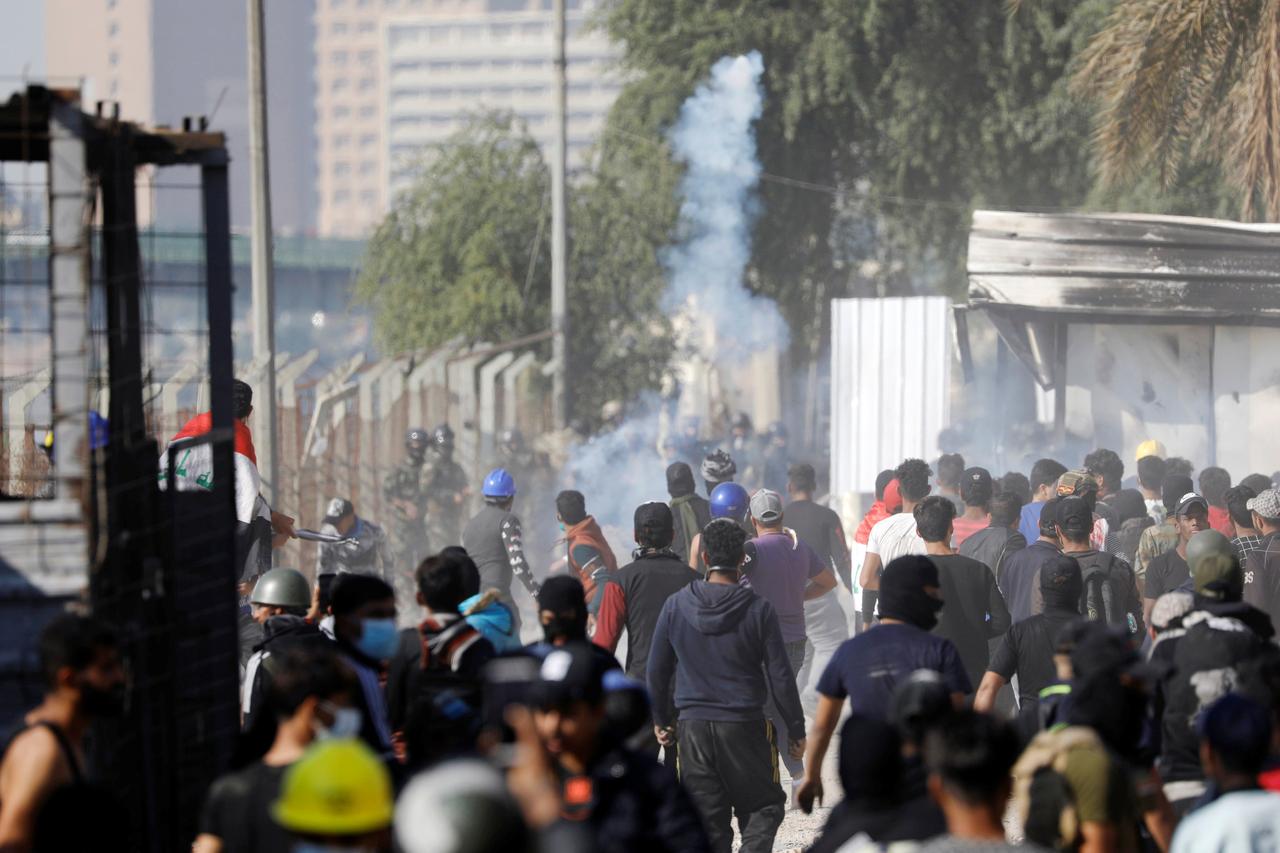
BAGHDAD (Reuters) – Iraqi protesters set fire to the entrance of a shrine in the southern holy city of Najaf on Saturday and security forces fired tear gas to disperse them, police and a demonstrator at the scene said, risking more bloodshed after a rare day of calm.
The demonstrator sent a video to Reuters of a doorway to the Hakim shrine blazing as protesters cheered and filmed it on their mobile phones. Reuters could not immediately verify the footage.
The incident took place during one of the bloodiest weeks of Iraq’s anti-government unrest, which erupted last month. On Friday, Prime Minister Adel Abdul Mahdi promised to quit to try to stem the violence and public anger.
Demonstrations continued elsewhere including the southern city of Nassiriya where protesters earlier surrounded a police station and in Baghdad. But there were far fewer reports of casualties than on the previous two days, when scores were killed nationwide in the Iraqi capital and the south in clashes with security forces.
Abdul Mahdi’s resignation announcement came hours after a call from Iraq’s top Shia Muslim cleric for the government to step down to end the unrest. The burning on Wednesday of the Iranian consulate in Najaf, the seat of Iraq’s influential Shia clergy, only deepened the crisis.
The unrest, which has killed more than 400 people, mostly demonstrators, amounts to the biggest challenge for Iraq since Islamic State insurgents seized vast swathes of Iraqi and Syrian territory in 2014.
It pits mostly young, disaffected Shia protesters against a Shia-dominated government backed by Iran and accused of squandering Iraq’s oil wealth while infrastructure and living standards deteriorate. Some anger has been directed at religious authorities which many protesters view as part of an out of touch ruling elite.
Security forces have used live ammunition, tear gas and stun grenades against protesters for nearly two months. Scores of the more than 400 dead have been killed in recent days, particularly in the southern cities of Nassiriya and Najaf.
At a funeral procession for protesters killed this week in Najaf, a Shia holy city, a mourner who declined to give his name said: “This man was protesting holding an Iraqi flag and a flower. He was shot dead. He’s a sacrifice for the nation.”
Iraq’s cabinet approved Abdul Mahdi’s resignation, his office said in a statement on Saturday, but parliament has yet to withdraw its support for the prime minister at a session on Sunday, making it official.
“The government has done all it can to respond to the demands of protesters and enact reforms … and calls the parliament to find solutions (to unrest) in its coming session,” the statement said.
Abdul Mahdi’s government, including himself, will stay on in a caretaker capacity following the lawmakers’ vote until a new government can be chosen, the prime minister said later on Saturday in a televised cabinet meeting.
“This is a positive thing … it show’s were no longer a dictatorship – governments do resign, and this is how authority is in democratic countries,” he said.
He added that President Barham Salih would then need to name a new premier for approval by parliament.
Iraqi protesters have welcomed the resignation but say it is not enough. They demand the overhaul of a political system they say is corrupt and keeps them in poverty and without opportunity.
FAMILIES MOURN DEAD
Populist cleric Moqtada al-Sadr, who has supported the protests but not thrown his full weight behind them, said late on Friday that demonstrations should continue and that the people should pick the next prime minister.
“The next candidate for prime minister should be chosen by popular referendum and picked from among five proposed candidates,” Sadr said in a statement on Twitter. He said protesters should meanwhile press their demands but reject violence.
The burning by demonstrators of the Iranian consulate in Najaf on Wednesday escalated unrest and led to Abdul Mahdi’s resignation. In Nassiriya, deadly clashes erupted on Thursday hours after the torching of the Najaf consulate.
Nassiriya was the scene of the worst violence to hit war-weary Iraq since the anti-government protests began in Baghdad on Oct. 1.
Many Iraqis fear violence will continue to escalate as angry families mourn dead relatives and the government moves slowly to enact only limited reform.
Weeks of political wrangling are expected before a successor to Abdul Mahdi is picked and a new government formed.
Iraq’s semi-official Human Rights Commission said on Saturday those responsible for the killings of protesters must be brought to justice and that it would gather evidence for prosecution.
A statement issued by the commission did not acknowledge the prime minister’s resignation.
The International Committee of the Red Cross urged a halt to rising casualties. “Firearms and live ammunition must only be used as a last resort,” it said in a statement.
Reporting by John Davison, Baghdad newsroom, Reuters TV; Editing by Toby Chopra and Hugh Lawson
Image: A demonstrator throws tear gas towards Iraqi security forces during the ongoing anti-government protests in Baghdad, Iraq November 30, 2019. REUTERS/Khalid al-Mousily




